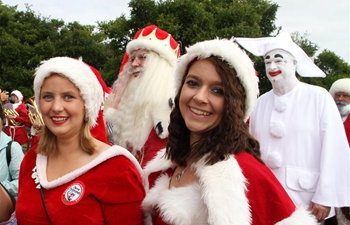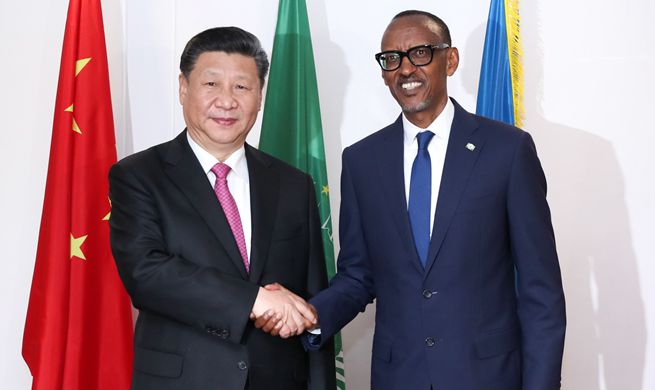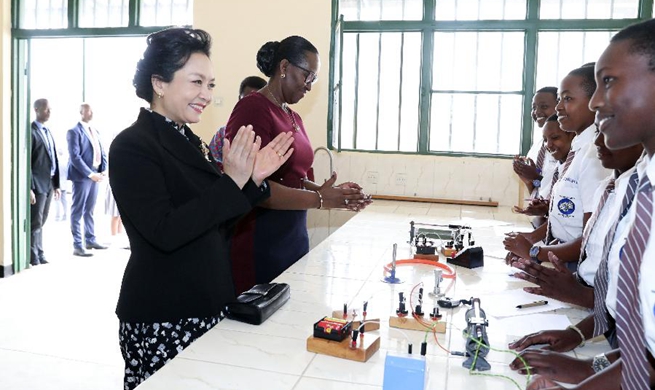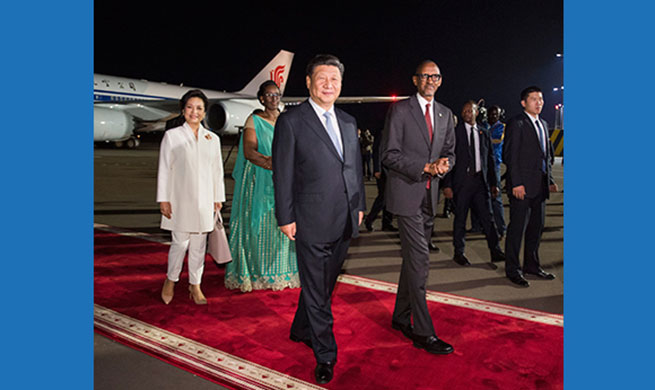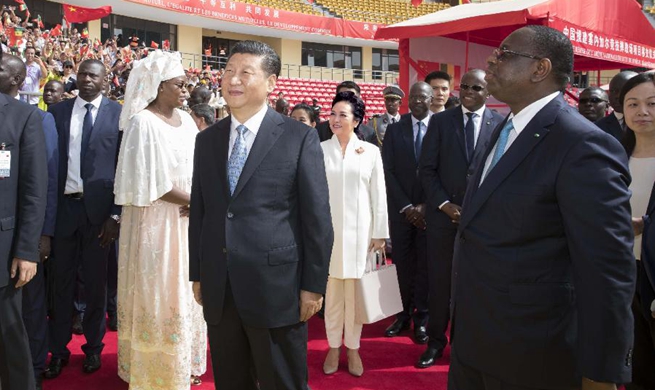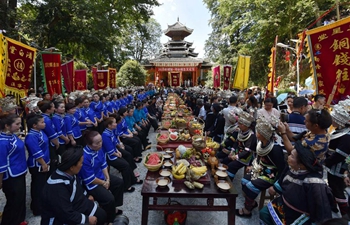LONDON, July 23 (Xinhua) -- The British government and the European Union (EU) have made their negotiating stances over the latest stage of Brexit clear, leaving the summer open for a period of behind-the-scenes negotiations, according to a leading Brexit expert.
"There will be a lot of posturing over the summer, and also a lot of backroom negotiating. Away from the headlines and the newspapers the two sides will be talking," Professor Anand Menon of the independent Brexit think-tank UK in a Changing Europe told Xinhua in a recent interview.
"I expect the two sides will talk, and there will be remarkably little of that leaked to the press," he said.
The incentives are there for both sides to reach an agreement and one of two things can happen, said Menon, who is professor of European politics and foreign affairs at King's College, London.
"One side or the other gives or there is no deal and neither side wants no deal."
Menon said that the talks were likely to center around achieving a Brexit deal that could be described as similar to the EU-Canada Comprehensive Economic and Trade Agreement (Ceta), or the EU-Norway trade arrangement.
Ceta allows both sides to enter into separate deals with other partners. It also puts Canada outside the EU's customs union and single market, within which there is tariff-free trade and free movement of people across national borders.
Norway is a member of the European Free Trade Area (EEA) and as such has full access to the single market but is not in the EU. It pays a contribution to the EU budget to gain that access and must follow EU trade rules.
People from across the EU are free to live and work in Norway, but it is exempt from EU rules on agriculture, fisheries, justice and home affairs.
"What the British government is counting on is that when both sides get closer to the deadline and EU member states are forced to give this issue a bit more attention than now, because most have other things on their minds right now, they will start to say that they need to be a bit more flexible," said Menon.
"What the EU will assume is that as both sides get nearer to that time the British government will start to say 'we will need to choose from the options on the table'."
"For Prime Minister May that is a dilemma, because the options on the table are either a slightly watered down version of the Canada Deal, watered down because there is not enough time to negotiate even the services provision of the Canada Deal, or an even more advanced version of the Norway Deal, and that is more Advanced because to accommodate Northern Ireland you need the customs union and elements of agriculture."
Menon says he believes the EU is offering something around those two options, but the British government will be focused on seeking some kind of third option.
"The British government thinks that if it can involve the member states it may be able to get a third option somewhere in the middle. We do not know with any certainty yet which way it will go."
DOMESTIC TENSION
While Prime Minister May and her team are handling their EU counterparts in the Brexit negotiations, May must handle her own Conservative Party, which is deeply split on the Brexit approach.
In the run-up to the White Paper and after a summit meeting of her Cabinet at May's country residence Chequers to agree the details of the paper, two key Cabinet ministers resigned in protest, along with several other junior ministers and senior party officials.
The resignations earlier this month of the Brexit Secretary David Davis, the Foreign Secretary Boris Johnson and other ministers and officials were a criticism of the softer Brexit stance that May took in the White Paper.
The British government's Department for Exiting the EU said the White Paper proposes a free trade area for goods that ensures continued frictionless access at the border, protects jobs and livelihoods and ensures Britain and EU meet their shared commitments to Northern Ireland and Ireland.
The 98-page document spells out that workers from the other 27 EU member states will be able to travel to Britain visa-free to take up temporary employment, and also that businesses that provide services will be able to move their talented people to and from Europe and Britain.
Davis and Johnson said they believed this was an unacceptable softer stance.
Johnson articulated the opposition at May's White Paper in his resignation speech in the House of Commons when he said it would lead to "a botched Brexit" and put Britain in "a permanent limbo".
Principal opposition to May's softer Brexit approach, which would see Britain agree to adopt EU rules in some areas of trade, is centered in the Conservative Party's European Research Group (ERG), which has a vocal presence among MPs.
But Menon believes May's White Paper could have called the bluff of the ERG, and of Johnson and Davis.
May's opponents have chosen, so far, not to challenge her premiership, said Menon, which he believes is a sign of weakness on their part.
"I think they do not wish to remove her is a charitable way of saying they don't think they can. If the rebellion comes from the ERG, they simply do not have the numbers to remove her."
May's Conservative Party has clear rules about a challenge to the leadership, which can be triggered by 48 MPs calling for it, but there needs to b 158 MPs to vote against May to topple her.
It is not clear if there is enough opposition to May's plans to trigger a challenge or for her opponents to succeed.
And another problem looms for May's opponents. "The problem for the ERG are that the rules of the Conservative Party state that if you have a leadership bid which the prime minister wins then you can't have another one for a year," said Menon.
"So, if they have one and lose it then they have lost all leverage over the process. That is what is giving them pause, rather than wanting to keep the prime minister where she is."
While this summer will not be one of a traditional holiday for negotiators on both sides, crunch moments are likely to come in the late summer.
"The key moments will be at the end of September when the British political party conferences are held and the October Britain-EU summit," said Menon.
Until then, May must be hoping for a summer where she can more fully concentrate on Brexit without worrying that members of her party are trying to oust her.
